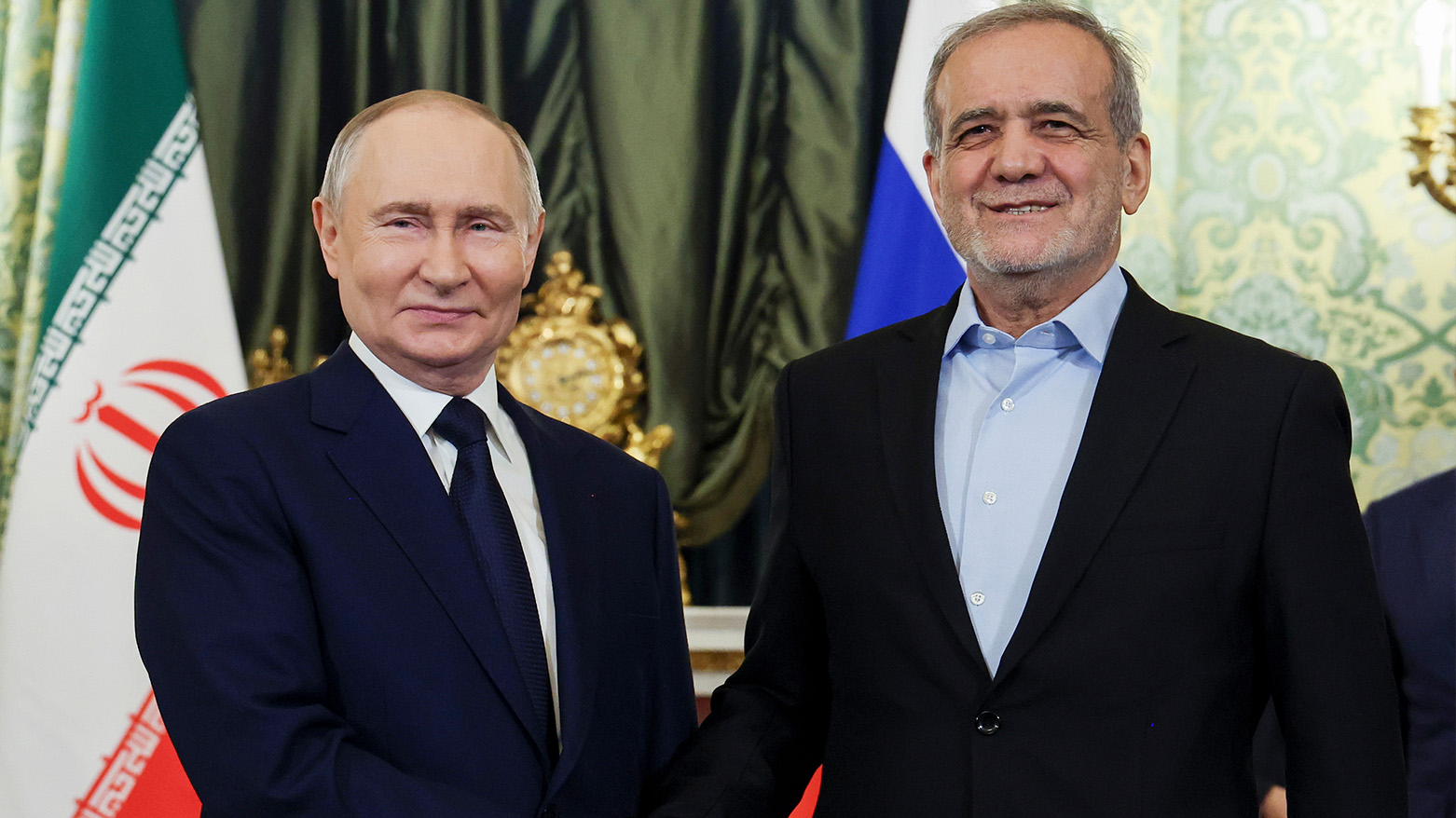Putin and Pezeshkian to Discuss Iran’s Nuclear Program at Shanghai Summit
Putin and Pezeshkian to discuss Iran’s nuclear program at Shanghai summit, Kremlin says. The meeting follows European powers triggering snapback sanctions over Iran’s nuclear advances. Russia condemns the move as destabilizing.

ERBIL (Kurdistan24) - Russian President Vladimir Putin will meet his Iranian counterpart Masoud Pezeshkian on Monday in China, on the sidelines of the Shanghai Cooperation Organization (SCO) summit, to discuss Iran’s nuclear program, the Kremlin announced on Friday. The high-level talks come amid escalating tensions over Tehran’s nuclear activities and renewed pressure from European powers to reimpose sanctions.
Presidential adviser Yuri Ushakov confirmed to reporters that “there are many issues to discuss, including the circumstances surrounding the nuclear program.” The Kremlin made clear that Moscow remains firmly aligned with Tehran as Western governments intensify scrutiny of Iran’s nuclear ambitions.
In a statement issued Friday, Russia’s Foreign Ministry criticized the decision by France, Germany, and the United Kingdom to trigger the so-called “snapback mechanism,” accusing them of undermining diplomacy. “We strongly urge them to reconsider and revise their mistaken decisions before they lead to irreparable consequences and another tragedy,” the ministry declared, condemning the move as destabilizing and counterproductive to ongoing efforts at dialogue.
The European trio—known as the E3—announced Thursday that they had formally informed the United Nations Security Council that Iran was failing to comply with the 2015 nuclear agreement, the Joint Comprehensive Plan of Action (JCPOA). In a joint letter, the E3 said that based on “concrete evidence,” Iran is not meeting its obligations and therefore they had no choice but to trigger the snapback mechanism.
The step launches a 30-day process that could automatically reinstate a wide array of UN sanctions that were suspended a decade ago, including restrictions on arms sales, financial transactions, and Iran’s ballistic missile program.
Iran swiftly condemned the European decision. Foreign Minister Abbas Araghchi denounced it as “unjustified and illegal,” insisting Tehran would “respond appropriately to protect its national rights and interests.” Araghchi argued that Iran has acted responsibly and in good faith, rejecting claims of non-compliance and insisting its nuclear program remains peaceful.
The United States, however, welcomed the European action. Secretary of State Marco Rubio issued a statement hailing the E3 decision as a “necessary step” to address Iran’s “significant non-performance.” He praised the Europeans for pursuing diplomacy before turning to snapback, adding that Washington will work closely with its allies at the Security Council to ensure the process is completed.
Rubio also emphasized that diplomacy remains on the table. “Snapback does not contradict our earnest readiness for diplomacy, it only enhances it,” he said.
The latest escalation comes just weeks after a 12-day war between Israel and Iran, during which U.S. forces also struck multiple Iranian nuclear facilities. In its aftermath, Tehran suspended cooperation with the International Atomic Energy Agency (IAEA), accusing the UN watchdog of bias and of providing Israel with “political cover.”
Although IAEA inspectors recently returned to Iran’s Bushehr nuclear facility, Director General Rafael Grossi warned that inspections cannot be selective. “There is no such thing as a la carte inspection work,” he stated, insisting on full access.
The E3 justified their snapback move by pointing to Iran’s accumulation of highly enriched uranium, which they said has “no civilian justification.” According to IAEA reports, Tehran’s stockpile now far exceeds levels needed for energy production.
Russia denounced the European step as “a dangerous destabilizing factor” that risks triggering a broader crisis. The Foreign Ministry stressed that “re-establishing constructive dialogue among all parties must be a priority to avoid another confrontation over the Iranian nuclear file.”
For Moscow, the snapback mechanism is seen as an effort by Western governments to isolate Tehran, while for Tehran it represents yet another breach of trust following the U.S. withdrawal from the JCPOA in 2018.
As the 30-day countdown begins, the international community faces a critical juncture. Iran has warned that if sanctions are reinstated, it may suspend what remains of its cooperation with the IAEA. Western governments argue that only firm measures can check Iran’s nuclear advances.
Putin’s upcoming meeting with Pezeshkian in Beijing underscores Moscow’s determination to rally behind Tehran at a time when Europe and the United States are closing ranks against it. Whether this summit will open space for renewed negotiations or deepen the standoff remains uncertain, but the stakes are higher than ever.